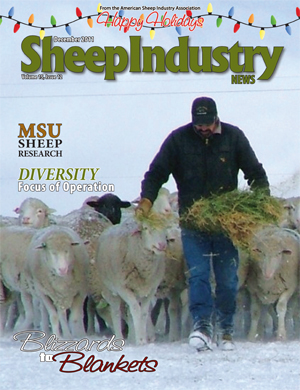
- December 2011
- Annual Convention Tours and Schedule Information
- ASI Receives Grant
- Conception to Consumption: Producer Focuses on Diversity
- From Blizzards to Blankets: Mooty Family Revives Historic Minnesota Mill
- Let’s Grow Media Tour Continues in Midwest
- Let’s Grow Topic at Trade Talk
- MSU Receives $743,000 for Sheep Research
- Proper Handling/Management Urged for TX Fine-Wool Sheep
- Research Shows Guard Dogs Relax Sheep
- Vilsack Announces ALB Appointments
(December 1, 2011) Montana State University (MSU) has received almost $743,000 to research the use of sheep in organic farming, incorporate those findings into MSU courses and share the discoveries with Montana producers and growers.
The three-year grant – announced Oct. 25, by U.S. Agriculture (USDA) Deputy Secretary Kathleen Merrigan – was one of 23 awarded by USDA’s National Institute of Food and Agriculture in 18 states. The grants totaling $19 million were given through two programs: the Organic Agriculture Research and Extension Initiative and the Organic Transitions Program.
“These days, there’s lots of competition for these funds. Funding is getting harder to find,” said Patrick Hatfield, principal investigator of MSU’s project and a professor in the Department of Animal and Range Sciences.
He was pleased, therefore, that MSU’s project was ranked first among all the projects submitted, Hatfield said. It not only meant that MSU received the grant, but it meant that MSU’s proposal was fully funded.
Merrigan said in her announcement that the purpose of the new grants is to help organic producers and processors grow and market high quality organic agricultural products.
“As more and more farmers adopt organic agriculture practices, they need the best science available to operate profitable and successful organic farmers,” Merrigan said. “America’s brand of organic agricultural goods is world-renowned for its high quality and abundance of selection. These research and extension projects will give producers the tools and resources to produce quality organic food and boost farm income, boosting the ‘Grown in America’ brand.”
Hatfield said organic farmers don’t use chemicals to control weeds, so they often rely on tilling the soil. But too much tilling and plowing can cause soil to wash away or blow away. The worst scenarios occurred during the 1930s when dust storms carried tons of topsoil for hundreds of miles.
The long-term goal of MSU’s study is to integrate sheep into farming systems in a way that’s profitable and environmentally sustainable, Hatfield said.
“Our goal is to use targeted sheep grazing to reduce tillage intensity, nitrogen leaching, greenhouse gas emission and improve soil fertility and soil carbon sequestration, while taking advantage of weeds, cover crops and crop residues for fiber and meat production,” Hatfield said.
The research project will focus on five crops grown in rotation over five years, Hatfield said. The crops include sweet clover, flax, winter wheat, lentils and spring wheat. Sweet clover will add nitrogen to the soil. Sheep manure and urine will act as natural fertilizers.
Most of the research will be done in the Bozeman area, at the Fort Ellis Research Farm and the Bozeman Agricultural Research and Teaching Farm (BART), formerly known as the Towne Farm.
In addition to the research, MSU faculty members will develop two new undergraduate courses and incorporate their findings into those and existing courses, Hatfield said. Stephanie Ewing, a soil chemist in the Department of Land Resources and Environmental Sciences (LRES), will develop a soil conservation and carbon sequestration course based in part on the research project. Hatfield will develop and teach a class on using sheep and other livestock in sustainable production systems. Perry Miller, an agroecologist in LRES will lead field trips to Fort Ellis during the organic cropping systems module of the sustainable cropping systems course he teaches. Anton Bekkerman, agricultural economist in the Department of Agricultural Economics, will use results from this project to introduce students to the economics of agricultural markets.
Weed management is a problem on organic farms, says one of the producers on the project’s advisory board. She said she and others hope that sheep will reduce weeds while helping prepare the soil for crops.

